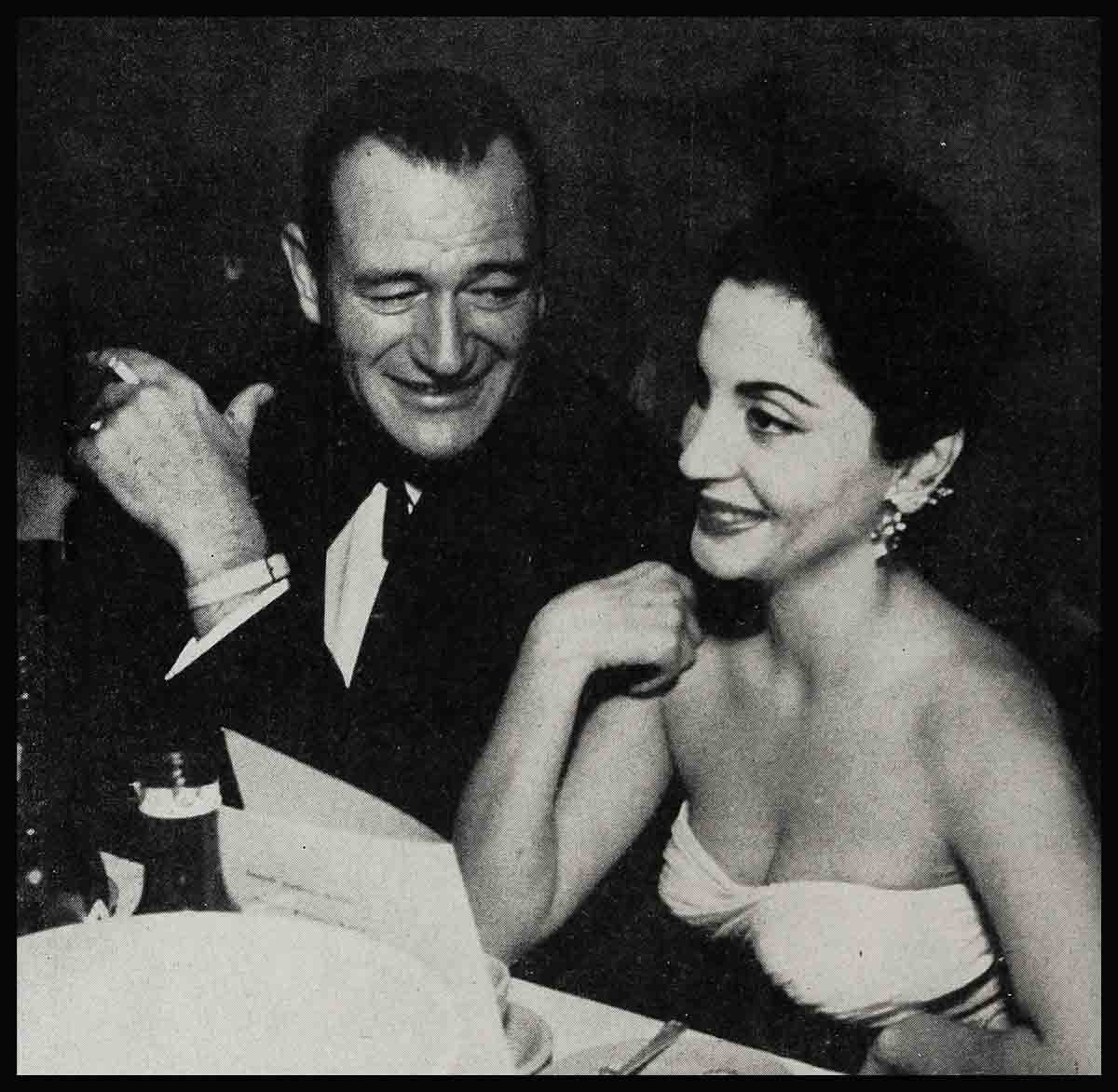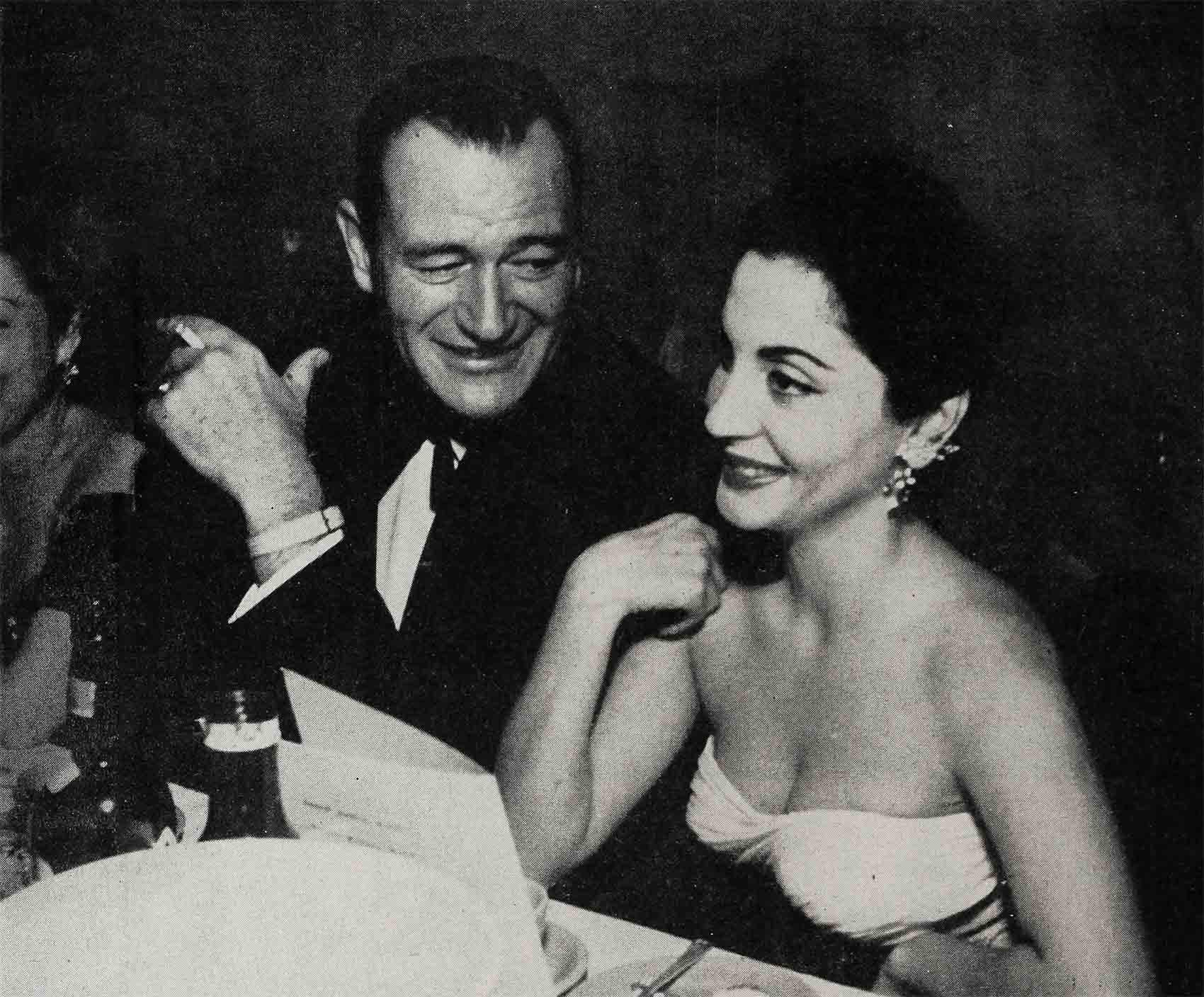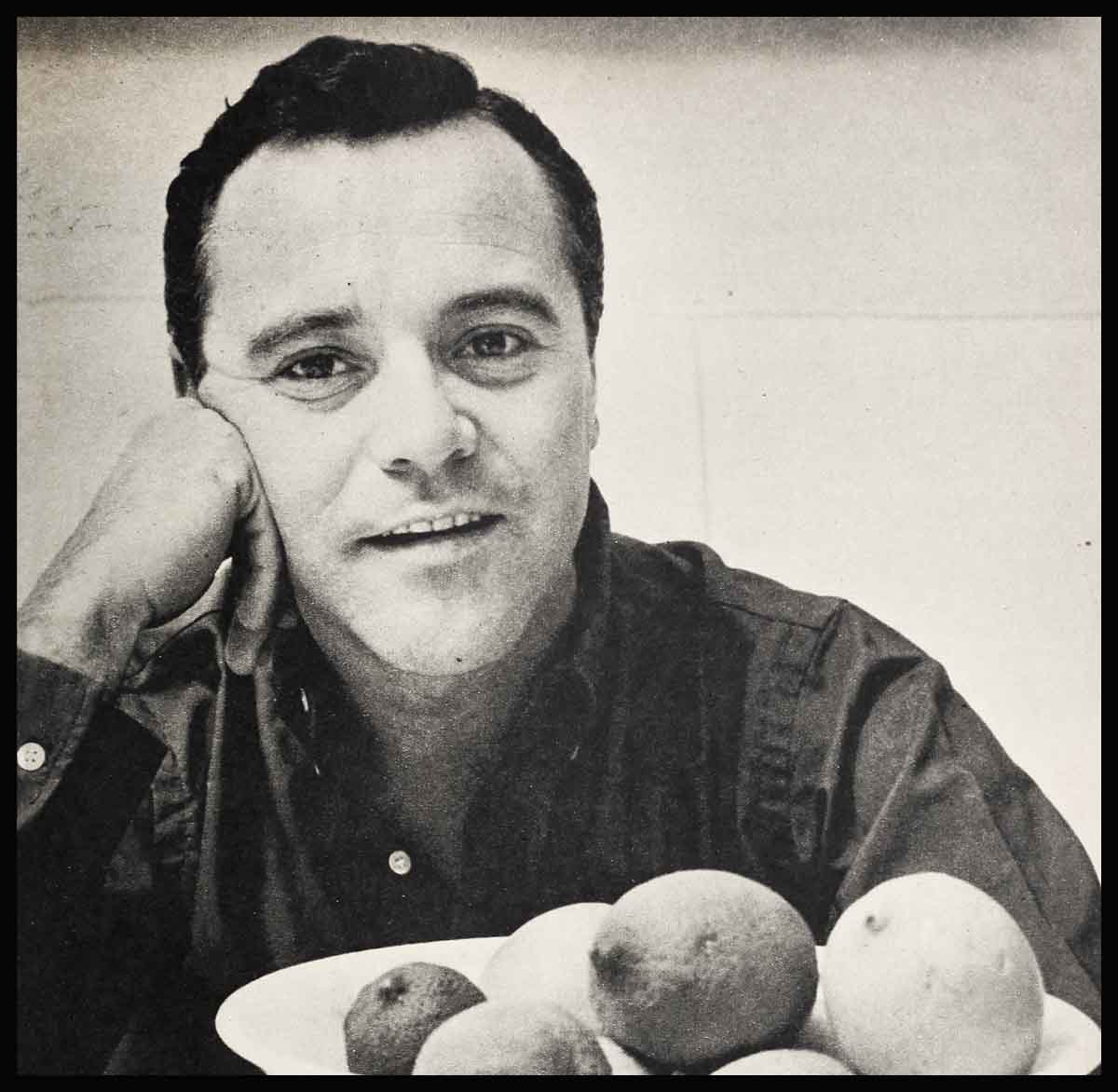
Has John Wayne Gone Again?
Marion Mitchell Morrison, who acts in motion pictures under the singularly simple name of John Wayne, is a rugged, gusty-lusty, two-fisted man of action who likes an occasional drink, an occasional practical joke, and a beautiful Latin-American female around the house all the time.
One of the major faults in Wayne’s second marriage, this one to Esperanza Bauer, the Mexican actress known as Chata, was that his woman was unpredictable, not only in temperament but in geography, too.
One out of every four Wayne pictures is filmed away from Hollywood on location. When Duke returned from these jaunts, he never knew whether his Chata—the name means pugnose—would be at home in the San Fernando Valley or down in Mexico with her mother.
Things finally got so bad between these two that a divorce was the only solution. Chata hired the famed criminal lawyer Jerry Giesler to represent her, and Giesler almost went nuts trying to determine from Wayne’s business manager, Bo Roos, just how much Duke is worth and just how much of his wealth is community property. Not even Duke knows that.
After a while things got so intricate that Giesler resigned from the case, and Chata hired another lawyer to obtain what she considers an equitable financial settlement.
The legal haggling in this divorce mess—and potentially it’s a nasty case with a good deal of soiled linen that had best remain unaired—will go on for many, many months, at least until October 19th, at which time a trial is scheduled in the California Superior Court.
When a man has been married twice, he becomes a creature of habit, especially where feminine companionship is concerned, so when Chata flew the coop and winged from Hollywood to Mexico, everyone around town knew that sooner or later, Duke would find a new heart throb.
Some of his friends said the supposition was ridiculous. “Look,” one of them told me last August, “Duke has had enough of dames and marriage for a while. His heart is broken. He really loved that Chata. Now, he’s gone out of the country for a while. He’s down in Peru, just taking it easy, scouting around for locations.”
In a way that was true, but while Duke was scouting for locations, he traveled into the Peruvian jungle to watch the first full-length motion picture ever shot in that South American country.
The film was being produced by Edward Movius; it was entitled Sabotage In The Jungle, and it starred a buxom, gorgeous, fiery, insinuatingly beautiful Limena (a native of Lima, Peru) named Pilar Pallete.
Pilar is 23 years old. She has the kind of figure men look at twice. They don’t believe it the first time. She is the third of four sisters. Her father, who died three years ago, used to be a Senator in the Peruvian legislature. She is well-bred, well-educated, and well-traveled.
As a girl she was sent to a very swanky school, the Villa Maria, but her father, a worldly man, wanted her brought up so that she would know how to look after herself in a world of domineering men. He enrolled her in the Lima High School, and it was here that she learned how to speak English, a virtue which helped her when she met Duke and his friends, although Wayne does manage a pretty good sort of pidgin Spanish.
The first time I saw her she was a hostess for Panagra, the Pan American Airline subsidiary in South America, and she was even then a real beauty, on her way to full development, captivating most of the male passengers.
When Duke Wayne first saw Pilar in the jungle last August and got himself introduced to her, a sort of electric current of mutual attraction sprang up between them.
For some inexplicable reason, probably because opposites always attract; Duke has consistently chosen Latin-American beauties for his attentions. They arouse him.
His first wife, Josephine Saenz, is of Dominican ancestry. His second wife is Mexican. And now Pilar Pallette, the utterly delightful and charming actress, comes from Peru.
Duke Wayne is a pretty sharp hombre, and in his soft, unobtrusive way, he began making inquiries. Had Pilar done much acting? Was she really a professional?

They told Duke that two years before she’d done some work for Sol Lesser in a film called The Lost Emeralds Of Illa-Tica. She’d also studied and worked a good deal in the Lima Theater Workshop.
Duke then asked the all-important question. “Is she married?”
The answer came as no surprise. In Lima all beautiful young women are married.
“Yes,” the informant said. “She’s married to Dick Wedy, the fellow in charge of publicity for Panagra.” Then the reprieve. “Only they’re not doing so hot. Broken up like you and Mrs. Wayne, or about to.”
Duke Wayne is an introspective man who rarely discusses his emotions. He feels things deeply, but the more profound they are, the less he talks about them.
Ask him, for example, how he feels about Pilar, and you get something like, “She’s an extremely talented actress.” Nothing more.
Ask him how he felt when he learned that his black-haired, heart-faced new discovery was on the verge of a break with her husband, and he’ll shake his head and walk away from you. It’s none of his business and none of yours.
He never trifles or talks lightly about women who mean something to him.
In the case of Pilar Pallete, he said nothing when he returned to Hollywood. But Pilar knew that if ever she came north she had a friend who would use all his influence to help her. And Duke Wayne has plenty of influence|in Hollywood. So much in fact that when he checked in at Warner Brothers after his Peruvian junket and they asked him to play the lead in The Iron Mistress, he read the script and promptly said no, and Warners said okay but will you please do something else, anything else.
Duke read the script of Trouble Along The Way, a story based roughly on Slip Madigan, the football coach at St. Mary’s College in California, and agreed to do the picture.
Later, he wasn’t too happy about his decision. But no one knew at the time whether it was because he was disappointed in the film, he had a subconscious, unrequited yen for Pilar, or he was irritated because detectives were on his trail trying to unearth a little embarrassing data that might be exposed in a divorce court. Duke was also upset because he had received a good offer to rent his ranch house, only Chata wouldn’t hear of it. Added to that was the fact that while he was worth a fortune, it wasn’t too easy for him to liquidate his assets into cash.
Anyway, Duke Wayne was not the easiest man in-the world to get along with during the filming of Trouble Along The Way.
Once Trouble was finished, however, Duke took off for Mexico where his own production company, Wayne-Fellows, Inc., was shooting Plunder In The Sun.
Now it so happens that when Duke pulled out of Hollywood, Pilar Pallete pulled in, ostensibly to do a Spanish soundtrack for Sabotage In The Jungle. Since she is still legally married to an American, Pilar has no visa difficulties when it comes to entering the country.
When Duke learned that the exotic, well-built Pilar was in movieland, he thought of a story named Pagodawhich his company owns, and the more he thought of that yarn, the more he felt certain that Pilar should play the lead in the production opposite him.
It was just a question of a few days before Pilar and Duke were in front of the cameras in Mexico. This was Pilar’s screen test, and needless to say, Duke went all-out in helping her. Johnny Farrow, a director, was supposedly giving the test, but Wayne knows a good deal more about picture-making than most directors, and he took over.
He posed Pilar in the best angles, saw to it that she got the best shots, made her feel very much at ease, and the result, of course, was a foregone conclusion.
Wayne-Fellows, Inc., signed Pilar Pallete to a seven-year contract, permitting her the privilege of making one outside picture per year for Movius Productions, the Peruvian Company that had given her her first screen opportunity. All of Pilar’s other films, however, will be released through Warner Brothers.
Just how successful Pilar will be, how quickly the public will take to her, no man can predict at this point. It is safe to say, however, that if she co-stars with Duke in his films, her popularity will be assured, because Wayne’s name on a marquee means top box-office.
The screen test completed in Mexico, Pilar eventually came back to the movie colony, moved into the house of a friend in North Hollywood, and now definitely estranged from her husband, began seeing a good deal of Duke who had taken a house on Valley Vista Road, not too far away.
They went driving together, toured the glitter spots, showed up at formal film functions such as the annual dinner of the Screen Writers Guild, and it was just a matter of days before Hollywood began to realize that Duke Wayne was happy again, genuinely happy.
At the Screen Writers Guild dinner, for example, he roared at Georgie Jessel’s jokes, cracked his own, greeted everyone with a big hand, proudly introduced Pilar to all the big shots, and carried on like the Duke Wayne of yesteryear. Smiling, exuberant, good-natured.
“Of course,” one of his friends cracked, “he didn’t know that Chata had flown in from Mexico that very night. But even so, I don’t think that would’ve made any difference. There’s absolutely no chance of a reconciliation. Duke wants a divorce as soon as he can get one. Then, I think he’ll marry this Peruvian doll. That is, if she has her own divorce by then.
“Don’t ask me why he goes. for these Latin-American babes, either. He’s AngloSaxon down to his very toes; you’d think he’d fall for some doll from Iowa. He just doesn’t. Soon as a girl has blonde hair, his interest fades.
“He has a big yen for these black-eyed senoritas. With two of them he’s struck out, at least marriage-wise. With Pilar, maybe he’ll ring the bell. Anyway, he seems happier than he’s been in a long long time.”
In Hollywood that’s what counts.
THE END
—BY ARTHUR L. CHARLES
It is a quote. MODERN SCREEN MAGAZINE JUNE 1953





No Comments